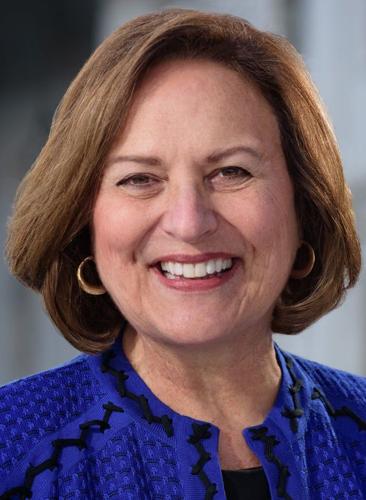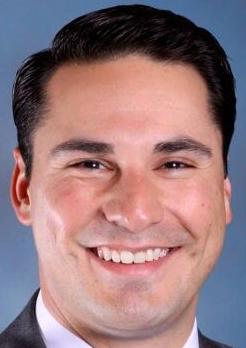Nebraska’s congressional delegation appears poised to deliver hundreds of millions of dollars to the state now that four of the five members have embraced the often-criticized practice of earmarking.
Led by U.S. Sen. Deb Fischer, the all-Republican delegation is on track to get more federal money for the 2024 fiscal year than the state has seen in a dozen years or more.
Fischer has lined up more than $120 million for Nebraska in her debut year on the influential Senate Appropriations Committee, which also marked the first time she has sought earmarks. The state’s three representatives combined for more than $82 million in House appropriations bills.

Fischer
Her role has been critical in boosting the state’s success at getting what the Senate officially calls “congressionally directed spending” and the House calls “community project funding.”
People are also reading…
Among her largest earmarks are $25 million for the University of Nebraska-Lincoln’s long-planned federal agricultural research center, $21.2 million for planning, design and construction of various buildings at Offutt Air Force Base and $12.8 million to build more four-lane miles of the Heartland Expressway in Scotts Bluff and Morrill counties.
A recent CQ Roll Call analysis found that Nebraska achieved the fifth-largest increase in dollars per capita this year, both on the House and the Senate sides.
On the House side, the state ranked fourth-highest for earmarks per capita, up from 37th last year. The analysis attributed much of the change to the GOP taking over the majority in the House, which boosted earmarking success for Republicans generally.
On the Senate side, Nebraska ranked 16th per capita, after being one of 12 states shut out of Senate earmarks last year. Neither Nebraska senator requested earmarks during 2021 and 2022.
It remains to be seen how much will wind up in the final spending bills, but earmarks from both houses typically carry through the reconciliation process after duplicates are removed.
Heath Mello, president and CEO of the Greater Omaha Chamber of Commerce, celebrated the results so far.

Mello
“The Greater Omaha Chamber has long held the position that when members of Congress advocate for federal funding for city and regional priorities, we gladly partner with them to organize support for this crucial work,” he said, adding that Fischer’s spot on the Appropriations Committee offers “enormous opportunities.”
“Her strong leadership and skilled advocacy for congressional-directed spending gives more influence to Midwestern states like Nebraska and will have a transformational impact on Omaha and communities across our state,” Mello said.
But Doug Kagan, with Nebraska Taxpayers for Freedom, took a dim view of the designated spending.
“Generally, our taxpayer group is against earmarks. Period.” he said. “Even if they are coming to Nebraska. It’s taxpayer money.”
Paul Landow, a longtime Democratic political operative from Omaha, said the value of earmarking often depends on who is doing the judging. Nebraska’s last congressional representative to use earmarking extensively was former Sen. Ben Nelson, a Democrat whose two terms in the Senate ended in 2013.
“Sen. Nelson faced partisan criticism for using congressional earmarks to bring money back to Nebraska, but now that the program has been reinstated, Sen. Fischer seeks earmarks without denunciation,” Landow said.
“If the earmarks are used to pay for worthy and needed projects, there is no harm because they would be funded sooner or later anyway,” he said. “But if the project is not essential, the earmark is a waste of taxpayer dollars.”
Fischer said she began requesting earmarks this year because of her Appropriations Committee position and because she has gained confidence that new guardrails will curb past abuses. Congress banned earmarks in 2011. They were reinstated with new restrictions in 2021.
“Being a member of the committee is definitely a benefit,” she said. “Nebraska’s at the table. I’ve fought to ensure that funding comes back home to Nebraska and contributes to important work.”
Former Sen. Ben Sasse opposed the practice and was one of 15 GOP senators who signed a 2021 letter vowing they would “not participate in an inherently wasteful spending practice that is prone to serious abuse.” In a statement at the time, he criticized the “swamp politics of earmarks” that feed the nation’s “addiction to debt.”
His successor, Sen. Pete Ricketts, has taken a similar position. Ricketts was appointed to the Senate in January after Sasse resigned to become president of the University of Florida system.
“Washington spending is out of control. I won’t be seeking earmarks until I feel government spending is under control,” he said, pointing to his record of holding state spending increases to an average of 2.8% while he was governor.
In the past, congressional earmarking sometimes led to more than just extra government spending. Multiple lawmakers served prison sentences for bribery and kickbacks before earmarking was banned.
The practice was reinstated after many argued that the ban merely gave the “power of the purse” to party leaders and the executive branch and offered lawmakers less incentive to work across party lines.
New rules seek to prevent the past problems. Those include requirements to post requests on each member’s website before a vote and to identify the entity that would receive the money. For-profit entities cannot get earmarks and members have to certify that they and their families have no financial interest in projects.
Top Journal Star photos for August 2023

Kipton Fankhauser loses his shoe as he falls off of "War Dance" during Mutton Bustin' at the Lancaster County Super Fair on Tuesday, Aug. 8, 2023, in Lincoln.

Patrons enjoy the first weekend of the outdoor carnival during the Lancaster County Super Fair at the Lancaster Event Center on Saturday, Aug. 5, 2023, in Lincoln.

Syllas Daniels and Kaneka Taylor (right) hold on tight as they ride the Orbiter at the carnival during the Lancaster County Super Fair at Lancaster Event Center on Saturday, Aug. 5, 2023, in Lincoln.

A nun peruses the animals on display at Rabbit Row during the Lancaster County Super Fair at the Lancaster Event Center on Saturday, Aug. 5, 2023, in Lincoln.

Angelina Mojok waves to the camera as she rides the merry-go-round at the carnival during the at the Lancaster Event Center on Saturday, Aug. 5, 2023, in Lincoln.

Cally Sullivan, Hannah Munk, Noah Schmoll and his sister Jocelyn (from left) let their rabbits hop from the starting line as they compete in a rabbit race during the Lancaster County Super Fair at the Lancaster Event Center on Saturday, Aug. 5, 2023, in Lincoln.

Offensive lineman Yahia Marzouk and Brady Eickhoff (from left) spring out from under the chute while running a drill during a practice at Lincoln Northwest on Wednesday.

Nebraska middle blocker Andi Jackson blocks assistant coach Jaylen Reyes during practice Tuesday at Devaney Sports Center.

Lincoln Pius X's Hudson Schulz (left) tackles teammate Sebastian Morales during practice on Tuesday at Pius X High School.

A view of the Federal Legislative Summit on Tuesday at Strategic Air Command & Aerospace Museum in Ashland.

Nebraska's Bryce Benhart (left) and Brock Knutson practice on Tuesday, Aug. 8, 2023, at Hawks Championship Center.

Lincoln Southwest's Zak Stark makes a throw during a football practice on Monday, Aug. 7, 2023, at Lincoln Southwest.

An excavator tears bricks off Pershing Center on Monday as demolition work begins in earnest on the former civic auditorium. Bringing down the structure is expected to take two to three weeks.

Young dancers spin one another as they perform a traditional dance with Wilber Czech Dancers during the annual Wilber Czech Festival on Saturday. The celebration will continue Sunday with a parade, motorcycle show, eating contest and much more.

Teams shoot around in the common area as they prepare to compete against one another during the 3-on-3 Railyard Rims basketball tournament at The Railyard on Friday, Aug. 4, 2023, in Lincoln. In collaboration with the Downtown Lincoln Association, the YMCA of Lincoln hosted the seventh annual Railyard Rims August 4-5. This 3-on-3 tournament takes basketball to the streets of the Railyard.

Callum Anderson gets his first haircut from barber Dean Korensky as he sits with his mother, Courtney Anderson, on Thursday at 33 Street Hair Studio. Callum was the fifth generation of the Anderson family to get a haircut from Korensky.

Carter Worrell has a staring contest with a baby chick during the Lancaster County Super Fair at Lancaster Event Center on Aug. 3, 2023.

A Nowear BMX rider jumps from a high ramp while teammates watch during the Lancaster County Super Fair at Lancaster Event Center on Thursday.

Zack Mentzer peeks out from a trailer while he and his family unload their Hampshire cross breed pigs the day before the start of the Lancaster County Super Fair at the Lancaster Event Center on Aug. 2, 2023.

Fair kids who show animals will set up in the stalls so they have a place to rest, the day before the start of the Lancaster County Super Fair at the Lancaster Event Center on Aug. 2, 2023.

Jen Witherby (left) and Mary Weixelman, bought 3 Daughters, last month and just recently completed their first week as owners.

Cooper Jordan, 4, runs the spray of a soaker hose during Sprinkler Day at the Eiseley Branch Library on Monday.

Protester Kari Wagner holds up a sign as Nebraska State Board of Education member Kirk Penner walks by in the Capitol on Monday.

Mack Splichal, 2, shows off his cheer moves to Nebraska cheerleaders Sidney Doty, Carly Janssen and Audrey Eckert (from left) during Nebraska Football's annual fan day at Hawks Championship Center on Sunday, July 30, 2023.

Shoes lost by previous skydivers are hung above the exit to the runway at the Lincoln Sport Parachute Club on Saturday, July 29, 2023, in Weeping Water.

Carpet Land players watch from the dugout as their team bats in the first inning during the Class A American Legion championship on Saturday at Den Hartog Field.

Nebraska's Darian White (left) talks with teammate Callin Hake during a team practice Thursday at Hendricks Training Complex.

Ten-year-old Connor Horner plays in the sprinkler fountain at Centennial Mall across from the state Capitol on Monday, as temperatures reached the 90s and the heat index reached into triple digits. The Lincoln Parks and Recreation Department said it discourages people from playing in the Centennial Mall fountains because the water is not treated.







